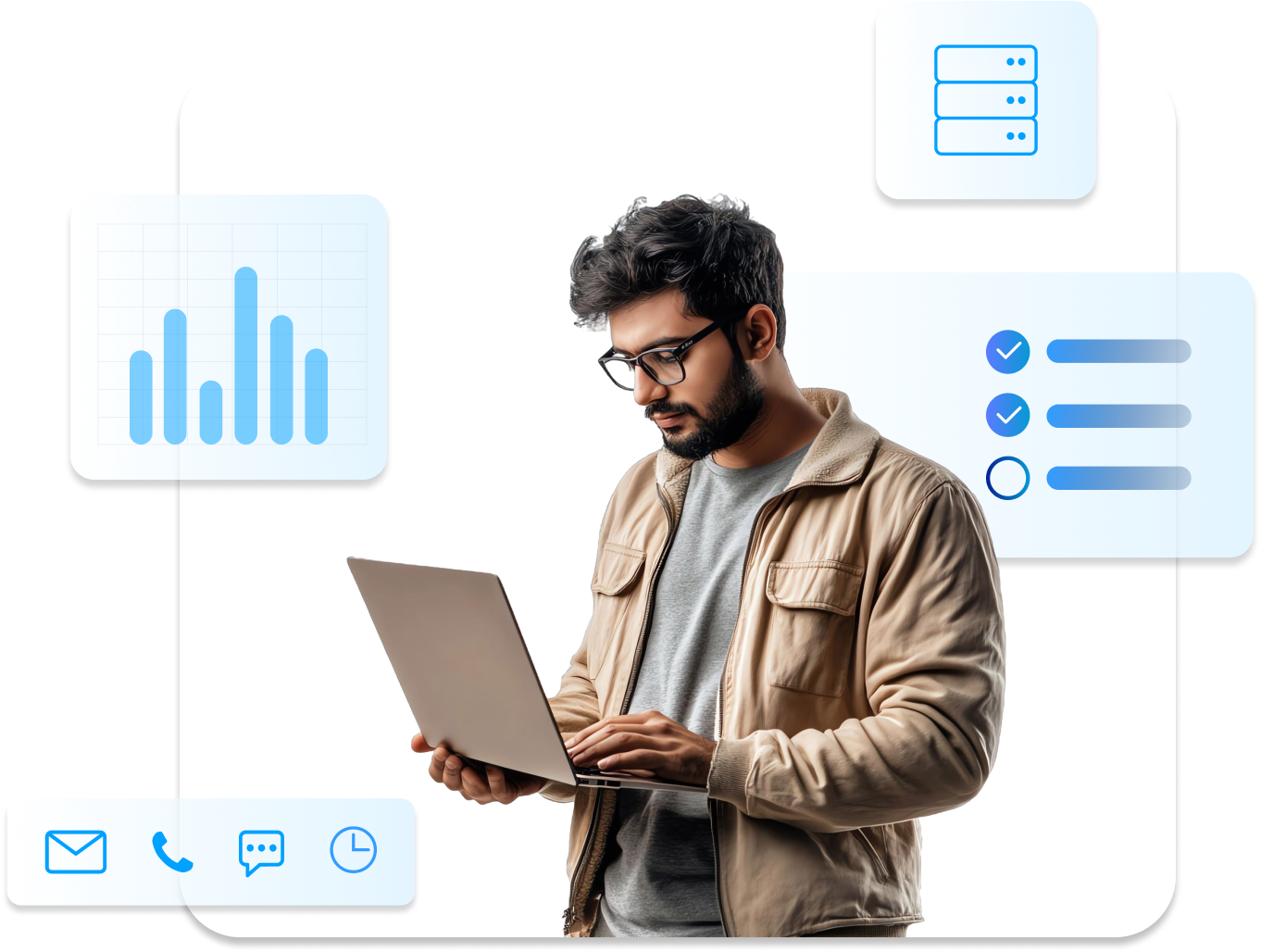CRM Strategy: Why Every Business Needs One
Without a CRM, managing leads, customer interactions, and sales pipelines can feel chaotic. A CRM ensures organization, efficiency, and better customer experiences by:
Streamlining customer relationships and interactions across multiple channels.
Tracking deals from initial contact to closure with ease.
Gaining a 360-degree view of support tickets, phone calls, and live chats.
Monitoring sales and marketing targets and pipeline progress.
Leveraging analytics for informed, data-driven decisions.
A strong CRM strategy does more than organize your customer data—it transforms how you build relationships and run your business. By focusing on meaningful customer connections, a CRM strategy helps you identify specific needs and deliver tailored solutions, enhancing satisfaction and loyalty.
Investing in a CRM strategy isn’t just about adopting software; it’s about creating a smarter, more efficient approach to managing relationships, streamlining processes, and driving long-term growth.
According to Nucleus Research, for every $1 invested in CRM, you get $8.71 in return. That is an ROI of greater than 750%!
A Brief History of CRM Software
In the 1960s and 70s, managing customer relationships was a manual effort. Businesses relied on journals and rolodexes to track leads and contacts—tools that were effective for their time but cumbersome and prone to mistakes. As industries grew and customer bases expanded, these methods simply couldn’t keep up.
The 1980s brought a shift. Companies began using digital databases to store and organize contact information, marking the early days of CRM technology. By the 1990s, these systems evolved into Sales Force Automation (SFA) tools, which streamlined sales processes and offered a glimpse into the potential of customer relationship management.
Fast forward to today, CRMs have become indispensable. No longer limited to sales, they now unify marketing, sales, and customer service teams on one platform. Features like automation, omnichannel communication, and advanced analytics ensure businesses can deliver personalized, seamless customer experiences at every touchpoint.
What started as simple contact management has transformed into a cornerstone of customer-centric strategies, empowering businesses to build stronger connections and thrive in an ever-competitive marketplace.
According to crm.org, 91% of companies with 10 or more employees use a CRM system in their organization.
What Makes a CRM Software Essential

Streamline Customer Interactions
If you're juggling multiple channels like email, social media, and phone calls, a CRM consolidates all interactions into one platform, making it easier to manage and track communication.

Efficient Lead and Sales Management
A CRM helps you capture, nurture, and track leads throughout the sales process. It ensures that no lead falls through the cracks and provides insights to close deals faster.

Automation of Repetitive Tasks
From follow-up emails to appointment scheduling, CRM software automates time-consuming tasks, freeing you and your team to focus on strategic activities.

Data-Driven Decisions
A CRM provides analytics and reports to help you understand customer behavior, sales trends, and campaign performance. With these insights, you can make informed decisions that drive growth.

Improved Customer Experience
By storing detailed customer information, CRMs enable personalized communication and service, which increases satisfaction and loyalty.

Scalability
As your business grows, managing customer relationships manually becomes unmanageable. A CRM scales with your company, ensuring smooth operations regardless of size.
Who Needs a CRM Solution the Most?
Small Businesses: To establish organized systems early on.
Sales Teams: To track leads and close deals effectively.
Marketing Teams: To segment audiences and execute targeted campaigns.
Customer Service Teams: To provide faster and better support.
If you find your team struggling with organization, losing track of leads, or spending too much time on manual tasks, it’s time to invest in CRM software.
Benefits of CRM Software
Boost Sales
Focus on high-quality leads with ease. A CRM streamlines your sales process, helping you close deals faster and turn prospects into happy customers.
Enhance Data Security
CRMs safeguard customer data with top-notch security. For businesses in the EU, GDPR compliance features keep you aligned with regulations.
Mobile Accessibility
Stay connected on the go. Mobile CRM apps let your team access and update customer info in real-time, anytime, anywhere.
Streamline Processes
Automate repetitive tasks and standardize workflows to boost productivity. Free up your team to focus on closing deals, not admin work.
Tactical Decision-Making
Get actionable insights fast. CRMs deliver accurate data and performance reports to guide smarter, growth-focused decisions.
Improve Customer Satisfaction
Solve customer issues faster with centralized data. A CRM equips your team to provide quick, personalized support that builds loyalty.
According to a survey, 47% of CRM users reported a significant impact on customer retention, with the same percentage noting improved customer satisfaction.
How to Choose the Right CRM Software?
When selecting a CRM solution for your business, the first decision you’ll face is whether to opt for on-premise or cloud-based CRM software. Let’s explore the advantages and challenges of each to help you make an informed choice.
| Feature | Cloud CRM | On-Premise CRM |
|---|---|---|
| Infrastructure | Requires no additional setup beyond a browser and a stable internet connection. | Requires the setup of servers and infrastructure on your business premises. |
| Accessibility | Access your CRM data anytime, anywhere, on any device. Most vendors also offer mobile apps for seamless use on the go. | Your data is hosted locally and can only be accessed through devices on your network. Developing mobile accessibility requires significant additional costs. |
| Trial Options | Cloud CRMs typically offer free trials, enabling you to evaluate the software before committing. | Free trials are not available due to the need for physical infrastructure and installation. |
| Cost | Operates on a subscription-based model (monthly or annual), with pay-as-you-go flexibility. | Involves high upfront expenses for servers and installation, alongside ongoing licensing fees. |
| Customization | Customizations are often quicker and more readily available, depending on the vendor. | Customizations are more labor-intensive and require extended deployment times. |
| Integration | Easily integrates with other business applications and APIs, ensuring smooth workflows. | Integrations are vendor-dependent and often need expert knowledge, regular maintenance, and additional costs. |
| Security | Vendors provide robust security measures, including access controls, to safeguard your data | Your organization is responsible for monitoring and safeguarding data, which requires a dedicated team and resources. |
| Scalability | Easily scale up or down to accommodate changes in users or storage needs. | Scaling requires significant investments in infrastructure upgrades or replacements. |
Why do Cloud CRM tools dominate today?
A decade ago, on-premise CRMs were the standard choice. However, advancements in cloud technology have made cloud CRMs the preferred option for most businesses.
In 2008, only 13% of CRMs were cloud-based. By 2017, that number had skyrocketed to 87%. This growth reflects the increasing demand for secure, scalable, and accessible solutions that keep businesses connected and agile.
With a cloud-based CRM, your data is not only safe but also accessible from anywhere, empowering your team to collaborate and serve customers effectively, no matter where they are.
Why Choose the HighLevel CRM Platform?
HighLevel CRM serves as a comprehensive platform, empowering businesses to simplify operations, improve customer engagement, and accelerate growth—all in one place.
Here's why HighLevel stands out from the competition
All-in-One CRM Solution
HighLevel combines CRM functionality with tools for marketing automation, sales funnel building, email campaigns, SMS marketing, appointment scheduling, and more. This eliminates the need for multiple tools and keeps everything in one unified platform.
CRM with Robust Marketing Automation
Automate your workflows, from lead nurturing to follow-ups, using HighLevel’s intuitive drag-and-drop automation builder. This allows you to save time while creating personalized, engaging experiences for your customers.
Multi-Channel Communication CRM Solution
HighLevel supports communication across various channels, including email, SMS, phone calls, and social media, ensuring you never miss an opportunity to connect with your customers.
CRM with Advanced Reporting and Analytics
Make data-driven decisions with HighLevel’s comprehensive reporting tools. Track your campaigns, sales performance, and customer behavior to continuously optimize your strategies.
White-Label CRM Capabilities
For agencies, HighLevel offers white-label solutions, allowing you to rebrand the platform and offer it to clients as your own CRM system. This can be a powerful way to generate additional revenue.
AI-Powered Features
HighLevel incorporates cutting-edge AI tools, such as AI chatbots, voice assistants, and AI-driven workflow suggestions, to improve efficiency and customer engagement.
Scalability for All Business Sizes
Whether you’re a solopreneur, small business, or large enterprise, HighLevel scales with your needs, ensuring you always have the right tools for your growth journey.
Exceptional Customer Support
HighLevel offers 24/7 customer support, onboarding assistance, and a vibrant user community to help you make the most of the platform.
Cost-Effective CRM Solution
By consolidating multiple tools into one platform, HighLevel reduces your overall software costs while delivering superior value at just $97/month.
Built for Agencies and Entrepreneurs
HighLevel was specifically designed with agencies, coaches, and entrepreneurs in mind. It offers features like client management, pipeline tracking, and marketing tools to help businesses scale efficiently.
Choosing HighLevel CRM means investing in a platform that simplifies your operations and empowers you to deliver exceptional customer experiences. With HighLevel, you can focus on what truly matters: growing your business!








